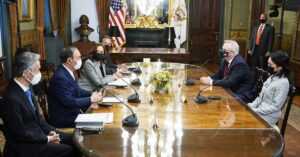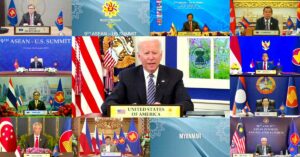ON Thursday, October 5, a group of dedicated individuals from Peace for Development held a lightning rally right at the doorstep of the House of Representatives. Their purpose — to stand shoulder to shoulder with and extend their unwavering support to the people of Cagayan and their resolute and steadfast leader, Gov. Manuel Mamba. The cause that unites them is a fervent and staunch opposition to constructing sites/bases in Cagayan under the Enhanced Defense Cooperation Agreement (EDCA). Their conviction stems from a belief that such a move is fueling and catalyzing the escalating tensions between the Philippines and China. They assembled with the united purpose of magnifying their voices through the corridors of legislative power and making known to the members of Congress that they stand on the side of peace and development in the face of complex geopolitical challenges in the Asia/Indo-Pacific region that the Philippines is faced with.
To recall, aside from the five existing EDCA sites, the government of President Ferdinand Marcos Jr. and the United States in February 2023 announced four additional EDCA sites, namely Naval Base Camilo Osias in Santa Ana, Cagayan; Camp Melchor de la Cruz in Gamu, Isabela; Balabac Island in Palawan; and Lal-lo Airport in Cagayan. The construction of these EDCA sites/bases is underway.
Unthinkable war
The resolute Governor Mamba refuses to see Philippine national interests sacrificed to prioritize and satisfy America’s strategic hegemonic interests and ambitions in the Asia Pacific and is unwavering in his fight against any form of neocolonialism. Mamba’s stance against EDCA is fundamentally rooted in his resistance to the notion of the US shaping Philippine national strategies through US military presence and influence. He opposes the further militarization of the Philippines, fearing that the country is becoming a vanguard, a buffer against China and a frontline pawn in the US’ unthinkable war plan against China.
In an article, “New Cold War or ‘the Unthinkable War’,” (in “China Without Blinkers”, Les Editions Delga, France, 2021; Dolphin Books, Beijing, 2022), Tamara Kunanayakam, former chairman/rapporteur of the UN Intergovernmental Working Group on the Right to Development and former Sri-Lanka permanent representative to the United Nations, indicated that a secret 2009 memo had revealed that the Obama administration was already planning for war against China. She wrote:
“US President Barack Obama’s ‘pivot’ or ‘rebalance’ to Asia Pacific, first announced to the Australian parliament in November 2011, was more than a simple change in geographic focus away from the Middle East and Europe. It was a fundamental shift in America’s international power politics. Henceforth, the principal adversary would no longer be Rumsfeld’s ‘unknown unknown’ terrorist but a clearly identified state perceived as the main threat to America’s global hegemony. At the center of his pivot was a military pivot, a realignment of strategy in relation to how, where, with what and with whom the war will be fought. Obama himself would not name the country until 2015, but a secret 2009 memo would reveal that his administration was already planning for war against China.”
The article further stated, “Although Obama had kept his China project secret, a confidential memo signed jointly by the US Navy and Air Force in 2009 revealed plans for the most brutal expression of his promise ‘to keep the peace’ — the ‘Air Sea Battle’ (ASB) plan for joint operations. The Chief of Naval Operations, Admiral Jonathan Greenert, described it as the centerpiece of the Navy’s ‘pivot’ to Asia. At the Pentagon, a new China Integration Team was entrusted with the task of applying ASB to a war with China, especially in and around the ‘first island chain,’ which encompasses the strategically located Taiwan island and all other islands, features and waters claimed by China in the East and South China Seas. The four archipelagos over which China exercises sovereignty is indicated by its ‘nine-dashed-line’ map, officially published in 1948, based on a 1946 map inherited from the Republic of China demarcating territories returned to it after Japan’s defeat in World War2.”
“At the core of Obama’s Asia Pacific pivot is the ‘military pivot.’ John Pilger, in his 2016 documentary ‘The Coming War on China,’ demonstrates how it led to ‘the biggest military buildup since the Second World War,’ with US bases forming ‘a giant noose encircling China with missiles, bombers, warships — all the way from Australia through the Pacific to Asia and beyond.’ As of Sept. 17, 2018, the United States had an estimated 800 military base sites outside its borders or 90-95 percent of the world total, and China, only one — in Djibouti.”
Mamba’s plight
On this note, it is apparent that Governor Mamba’s apprehension against the construction of EDCA bases/sites in his province is not without basis. Obviously, amid the intensified geopolitical and major strategic competition between superpowers in the region, it is becoming more apparent that the nine EDCA bases/sites are part and parcel of the US’ intensified buildup of military forces in Asia under the US Pivot to Asia strategy.
In this regard, the potential and the possibility that the Philippines being situated in a very strategic position geopolitically speaking in the Asia-Pacific region, with the strong presence of US troops, pre-positioned US military assets, EDCA bases, may end up becoming the launch pad for the US security and military operations, and cannon fodder for America if there is a military confrontation between superpowers.
Thus, Mamba’s fear that the construction of EDCA bases in his province and in other locations would compromise and undermine the national survival and security of the country if a military conflict breaks out is a reality that is not a distant possibility. One must recognize that these EDCA military bases will become prime targets for retaliation or attacks because of US military assets and boots on the ground. For any Filipino, who is truly and genuinely concerned about their country’s welfare and the well-being of their fellow Filipinos, this is indeed worrisome.
Despite the gravity of these concerns, the Marcos administration appears to overlook the profound risks posed by EDCA and its associated bases and sites. Rather than carefully evaluating these matters with the caution and prudence they deserve, they seem to turn a blind eye to the dangerous implications. They choose to disregard the earnest pleas, wisdom and insight behind Governor Mamba’s resolute opposition to EDCA. According to a credible/trustworthy source, Mamba is faced with political pressures emanating from the administration, adding a layer of complexity to his already challenging situation. The swift and aggressive pace of the investigation by the House into Mamba’s alleged illegal use of government funds during the May 2022 election campaign is perceived by many as a political tool intended to stifle and quash his resolute, unwavering voice. Nevertheless, Mamba remains steadfast in his opposition to EDCA. This steadfastness deserves our wholehearted embrace and support.
Conclusion
Uniting in solidarity with Governor Mamba and other passionate Filipino nationalists such as Ambassador Bobi Tiglao, Herman Laurel, Ado Paglinawan, Sass Rogando Sasot, and many others, who bravely and staunchly resist and oppose the US quest for hegemony in Asia, its neocolonial tactics, ambitions and the militarization of the Philippines, and who are taking a firm stand against EDCA and the nine EDCA sites/bases is a genuine badge of honor even for the humblest among us.
Source: The Manila Times
https://www.manilatimes.net/2023/10/07/opinion/columns/unthinkable-war-and-the-plight-of-anti-edca-governor-mamba/1913516



